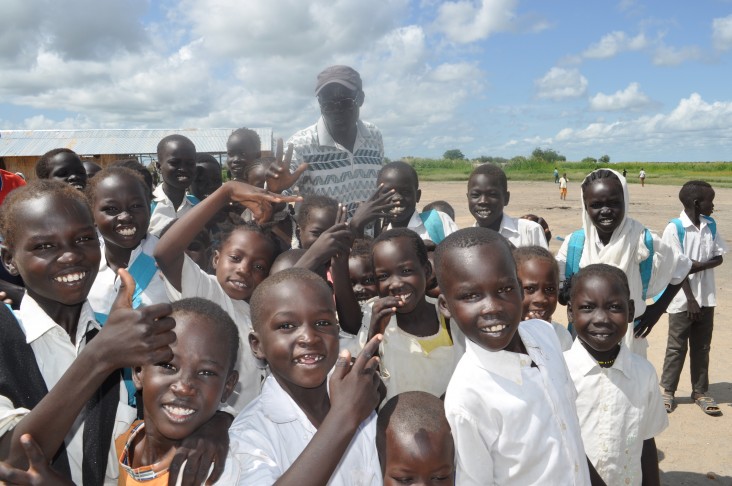Speeches Shim

September 2018 — In South Sudan’s far north, the Nile River port town of Renk has long been a crossing point for people heading north or south, sometimes fleeing conflict, sometimes heading back to their home areas during times of peace. Many people have become stranded there, as they lack even the modest funds needed to complete their journey.
Primary school teacher Ali Kenyi, 49, arrived in Renk in 2011 and has since been unable to complete his journey to the capital, Juba, 600 miles south. Yet his passion for teaching inspired him to help the children around him who are displaced by conflict.
“I used to see many children in the camp who didn’t go to school because there was no school in the internally displaced persons [IDP] camp where I live. I felt bad because a generation was wasting before my eyes,” said Kenyi.
One day, he decided to buy a file and some papers and went around the IDP camp to register school-age children. He registered more than 140 children age 5 and older.
“The parents of the children were very supportive. They told me, ‘Take our children to school so that they don’t end up illiterate like us,’” said Kenyi.
After registering the children, Kenyi looked for space to start a school. The host community gave him a two-room abandoned building near an unused army warehouse. When he began in 2014, he was the only teacher in the new school, Payuer Primary School.
Kenyi was soon joined by other volunteer teachers. In addition to classes for grades one through five, they added an early child development center for children younger than 5.
While teaching, Kenyi noticed that some students slept in class. “When I asked them why they were sleeping in class, they would say they were hungry,” he said sadly.
In May 2018, World Vision started a school feeding program at the school with the support of USAID and UNICEF. The head teacher said the program has helped keep children in school and improved their performance. Absenteeism is no longer an issue in the school.
USAID has also supported the school with textbooks and other learning materials through UNICEF, and in 2017, USAID built four classrooms, which has eased overcrowding as the school’s attendance grew.
“The construction of the new classrooms has seen an increase in child enrollment to 306. Out of this, 126 are girls,” said Kenyi. “When we give education to these children, they will be our hope, and we will not fight among ourselves.”
LINKS
Follow @USAIDFFP, @USAIDSouthSudan, on Facebook, on Flickr

Comment
Make a general inquiry or suggest an improvement.